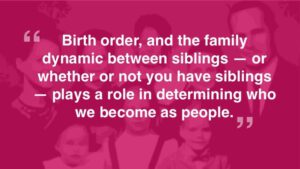There’s nature and nurture and then there’s all that bickering – or lack of it – with our brothers or sisters.
Birth order, and the family dynamic between siblings – or whether or not you have siblings – plays a role in determining who we become as people.
So in honor of National Sibling Day, which was a few weeks back, one of our scientists, Aaron Kleinman, looked at what our data could tell us about how birth order and family size influence us.
First off, it is pretty clear that it does make a difference if you were born an only child, or were the first, or last or middle child in a family, according to 23andMe data. Aaron found that being older or younger affects measures of intelligence and personality, impacting things like whether you’re more likely to have taken advanced math or whether you are more agreeable and altruistic.
This is all well-trod territory, with plenty of studies over the years looking at birth order and its influence on everything from personality traits to intelligence and health. Some of those studies confirm the stereotypes we have about first and last born children, and some – like its influence on allergies or the risk for cancer – are harder to peg.
A First Born Child
– Tends to start reading earlier
– Tends to take more advanced math classes
– Tends to be less tactful
A Last Born Child
– Tends to be more altruistic
– Tends to be less tense
– Is more likely to own a dog
An Only Child
– Tends to start reading earlier
– Is more likely to learn another language as an adults
– Is less likely to be able to do a cartwheel
Ever since Cain and Abel, there has been a fascination with sibling relationships. And with that interest come some well known clich̩s Рthe luster of the smart and driven first born, the carefree and crafty youngest child and the middle kid who is just trying to keep the peace.
But there has also been some interesting science around sibling relationships and birth order and what influence it has on development.
One of our favorite studies looked at differences between 700 brothers who played in Major League Baseball. The data showed that younger brothers attempted to steal bases way more than their older brothers. The study, by researchers at UC Berkeley and Guilford College, tended to support the evolutionary theory that younger siblings are more likely to be risk takers. The theory is that the youngest sibling has to fight harder and be a little craftier to get his or her parents’ attention.
In our data Aaron also found that birth order affects personality, and although we didn’t see anything about base stealing, 23andMe data showed that younger siblings were less tense, more agreeable and more altruistic than their older siblings.
But studying these kinds of differences among siblings can be tricky, said Aaron.
In other words, some of the differences might be more a reflection of why the family is big or small as opposed to whether a child is older or younger. For example, it may be that people who are religious tend to have big families. So to control for family size and other things, Aaron ran several different analyses, all using data from 23andMe customers of European ancestry who’d consented to research. Aaron did things like restrict the customers he looked at to those who had precisely one sibling and then looked at the effect of being the first-born versus the last-born.
Aaron found that the 23andMe data confirms what some others studies have said about first-borns being smarter. Or more specifically, 23andMe data showed that first-born kids read earlier and take more advanced math classes.
But other findings in the 23andMe data were for things we hadn’t seen before.
Aaron found a correlation between birth order and taste. Those who had fewer older siblings were more likely to enjoy cilantro and dark chocolate, for instance. We couldn’t explain that one with evolutionary theory.
Another odd correlation shows that younger siblings were more likely to be able to whistle and own a dog.
Not wanting to leave anyone out, Aaron also looked at only children. He found that they were more likely to have learned another language and less likely to be able to do a cartwheel.
This focus on you family dynamic is helpful for researchers here at 23andMe as they try to sort out the interplay of genetics and environment for various conditions.



